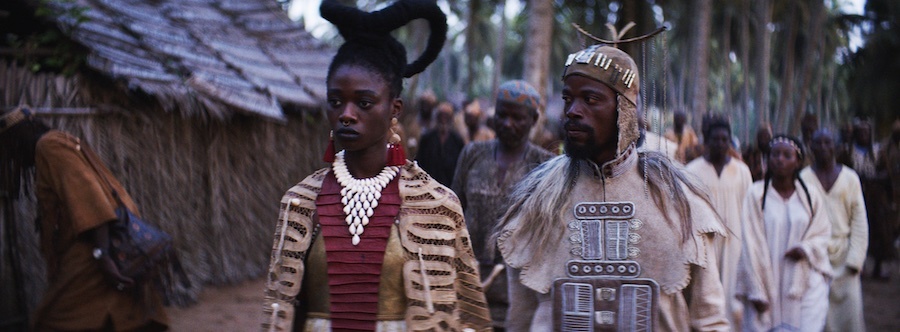Night of the Kings: A Love Letter to Storytelling
Review of Night of the Kings, presented by
Written by Teen Writer Audrey Liepsna Gray and edited by Teen Editor Mila Borowski

A slow-moving shot of a thick forest opens Night of the Kings, slowly panning up and revealing a massive penitentiary in the midst of the trees. Shouting voices fade in to join the gentle ones of the birds and cicadas, and the prison looks grey and imposing. The camera cuts to a distressed boy sitting in the back of a police truck, looking back and forth between the forest and the dingy prison wall on either side of him. It’s in these very first reels that we’re given a taste of Night of the Kings’ unique sensory atmosphere. The film intrigues our senses through its vivid depictions of the domain we’re pushed into, right from the beginning up until the end of the film. Rich colors, precise use of lighting, and ambient use of sound play important roles as the film establishes its environment in a way that felt more thoroughly brilliant the longer I watched.
Night of the Kings is a 2021 film written and directed by Philippe Lacôte. It begins with an introduction of La Maca, a prison ruled by its inmates with their own laws and customs. We follow a young new prisoner (Bakary Koné), who arrives at La Maca to turmoil inside. The Dangôro, leader of the inmates and sole authority within the microcosm, is old and sick, and tradition dictates that when the Dangôro is no longer able to lead, he must take his own life. The current Dangôro, Blackbeard (Steve Tientcheu), is being challenged and pressured from all sides to step down. In a pitch to bring peace to the prison on the night that he must die, he designates the newest inmate as the prison’s storyteller called the Roman. On the night of the red moon, the Roman must tell a story to last the hours of the night and keep his audience enraptured. If he doesn’t, he pays a price—in his own blood. It’s through the story he tells and the night’s events in the prison, coupled with expertly used sensory depictions, that we’re shown the complex world of the prison and the world outside it. It’s a place of vibrant color, expressive art, and a fascination with the fantastical and spiritual. As the bright day turns into a vivid and spiritual night, we can see the importance of storytelling to the inmates and the film’s attitude towards the art it depicts.
Night of the Kings is a film that draws heavy inspiration from the Ivory Coast’s storytelling heritage. Griots are storytellers, musicians, and poets who maintain a cultural tradition of oral history in parts of West Africa, including the Ivory Coast. It’s a cherished role in various cultures, a position that maintains histories in the cultural mind. Night of the Kings seeks to honor the tradition of griots and the legacy of storytelling by creating an enclosed world of its own; through this, the full significance of the Roman’s role as functional griot for the prisoners can be seen and analyzed in a smaller setting. La Maca mirrors the outside world within the film, with customs, politics, and laws of its own. In this way, we can see how the Roman’s storytelling role represents the part storytelling plays in conveying history, information, and personal feeling to entire communities in the outside world.

Just as the Roman plays with time and fantasy in his tale that seems to time-travel between ancient kingdoms and the modern world, the film maintains an interesting narrative balance
between the world of La Maca and the outside world. It contributes to the feeling of contrast between different aspects of the film, different times, places, and atmospheres. It’s thoroughly impressive the way Night of the Kings manages to be so cohesive with such contrast between these different aspects of the story, maintaining a sense of continuity throughout the film.
When watching Night of the Kings, I couldn’t stop holding my breath. The remarkable creative direction of the film made the sensory choices even more appreciable with the unique personality of the plot. I was struck with after-film clarity by how amazingly it all complemented the story and the themes the film portrayed. Each step into the enchanting and brutal world that the film spun felt more intriguing than the last and every new scene felt like a new exploration of art that I hadn’t considered before. The heartfully artistic—and at times spiritual—feel of every creative choice made the movie feel like one of the most genuine love letters to storytelling and art that I’ve ever seen. It was immersive, sincere, cruel and woven through with threads of a spellbound admiration for the power of story—an admiration, perhaps, that made this story all the more impactful and gorgeous.
Night of the Kings screened at SIFF from February 26 to March 25. For more information see here.
Lead photo credit: Night of the Kings. Bakary Koné. Courtesy of NEON.
The TeenTix Newsroom is a group of teen writers led by the Teen Editorial Staff. For each review, Newsroom writers work individually with a teen editor to polish their writing for publication. The Teen Editorial Staff is made up of 6 teens who curate the review portion of the TeenTix blog. More information about the Teen Editorial Staff can be found HERE.
The TeenTix Press Corps promotes critical thinking, communication, and information literacy through criticism and journalism practice for teens. For more information about the Press Corps program see HERE.

